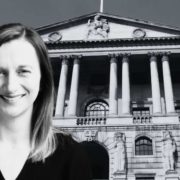The past few weeks have been a wake-up call for the housing market, a realisation that we have moved decisively out of the era of ultra-low interest rates.
Suddenly, many people are looking with great nervousness towards the point when they will have to remortgage and praying that mortgage rates will have eased back by the time they have to do so.
Landlords are going through a similar process.
This month has already given us the biggest increase in official interest rates for a very long time.
When the Bank of England increased Bank Rate from 2.25% to 3% on November 3, this was the first time that rates had risen by this much since “Black Wednesday” in September 1992, when the government tried unsuccessfully to prop up the pound within the European exchange rate mechanism (ERM).
Or, since those rate rises did not last the day, since 1989.
We had got used to the Bank raising rates in small amounts, typically a quarter of a point.
August’s half-point increase, matched by a similar rise in September, were the first increases by what financial markets would call 50 basis points in the independence era, which began 25 years ago in 1997.
This month’s 75 basis point increase took us into new territory.
This accelerated pace of rate rises can be justified by the fact that inflation is in double figures and that pay growth is accelerating.
Latest figures show that regular pay across the economy is rising by 5.7% compared with a year earlier.
That is well below the rate of inflation, but well above the Bank’s comfort zone.
Private sector pay is rising by 6.6%, that in the public sector by just 2.2%.
But, and here is the odd thing, these rate rises are coming at a time when the economy is already weak.
Gross domestic product shrank in the third quarter, perhaps the start of what economists, including the Bank, think could be a long recession.
The job market remains generally strong but unemployment has begun to edge higher, redundancy rates are increasing (but remain below pre-pandemic levels) and job vacancies have started to fall.
These would normally be the circumstances when, if not for high inflation, interest rates would be falling, not rising.
So how high will they go, and what will happen to mortgage rates?
The Bank has sent out a pretty clear message that rates do not rise as much as the markets expect in order to bring inflation back to the official 2% target.
But markets are sceptical and are less inclined to believe the Bank than in the past, not least because the message it sent out in August was that a 3% Bank Rate would be enough to do the trick.
The reaction to the disastrous mini budget in late September has left markets jumpy, so they think a rate of between 4.5% and 5% will be needed.
That would take us back to the levels prevailing before the financial crisis, 15 years ago, and would be a bitter pill to swallow for a generation that has grown up accustomed to bear-zero rates.
My view is that the peak will be below that, at about 4%, and that rates will not necessarily stay at the new higher level.
Markets will be on the lookout for what they call the “pivot”, which is when central banks including the Bank decide that they have done enough and that they can contemplate reducing rates.
We are some way from that now, but it should be in sight by the middle of next year, as inflation starts to fall.
That is also the key to where mortgage rates settle.
Financial markets have calmed down a lot since late September and early October, with two-year gilt yields down from more than 4.5% to just over 3%.
But fixed-rate mortgage offers remain high, though they are also down from the peak.
Part of the reason for this is that lenders anticipate further increases in official interest rates.
That too should settle, as markets price out some of the rate rises they are currently discounting, but it will take a while.
Borrowers will pay more than they have been used to but not as much as they fear.
It is an interest rates shock, but it should not be quite as big a one as it has looked recently.

























Comments